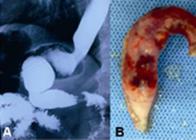HEADINGS:
Gastrectomy; Weight gain
INTRODUCTION
Modified laparoscopic sleeve gastrectomy (MLSG) is a great option to control diabetes mellitus type II, obesity and other co-morbidities. However, a common challenge of bariatric surgeries is weight regain in the long term.
Re-sleeve gastrectomy started a few years ago and is suggested to be a feasible option to manage these situations. In Latin America there is no case reported of re-sleeve gastrectomy after MLSG at now.
Therefore we present a case report of an individual submitted to re-sleeve gastrectomy after weight regain after seven years of MLSG.
CASE REPORT
LSF, 48 year old caucasian, male, Brazilian went to private practice in São Paulo, in 2009, presenting the following conditions: severe obesity with BMI of 47, type II diabetes mellitus, hepatic steatosis and hypertension. Therefore, he had a metabolic syndrome and a severe obesity. He was submitted to the following exams: peptide C (2.86), anti-GAD antibody and anti- insulin antibody negative and fasting glucose (285 mg/dl) with Januvia and Glifage usage.
MLSG (Figure 1) was performed in 2009. It basically consists in the removal of part of the gastric fundus and body of the stomach up to one inch from the pylorus vein, reducing the production of ghrelin4. In the following eight months after surgery, patient moved from BMI of 47 to 27.5. As a result he got his diabetes and metabolic syndrome controlled. Seven years later returned referring the capacity of eating a larger volume and weight regain. His new BMI was 34,5. Given this clinical scenario were requested abdominal ultrasound, oral contrasted esophagus, stomach and duodenum and upper gastrointestinal endoscopy (Figure 1A).
A) Contrasted esophagus, stomach and duodenum demonstrating moderate fundus dilatation; B) surgical specimen of re-sleeve (12 cm of gastric fundus)
Laparoscopic cholecystectomy with cholangiography was performed and also a partial gastric fundus re-sleeve (Figure 1B) was executed using articulated linear stapler and load-blue clips and reinforcement over suture with polidioxanone 3-0. Surgery obtain great results and without any intraoperative and postperative complications. Patient stayed in hospital for 48 h.
After six months of the procedure he had no complication, 12 kg weight loss and stopped all medications. He presented a change in BMI=8%, excess BMI loss (%EBMIL) of 84.21% and percent of total weight loss (%TWL) of 12.37%.
DISCUSSION
Literature present few publications describing re-sleeve gastrectomy. None of them in the Latin-America and none reporting MLSG as the primary bariatric procedure.
In 2006, Baltasar A, et al. reported two patients that were submitted to laparoscopic sleeve gastrectomy and when they regained weight, laparoscopic re-sleeve gastrectomy and duodenal switch were performed and reduced patients BMI after 3-4 months11. Baltasar A, Serra C, Pérez N, Bou R, Bengochea M. Re-sleeve gastrectomy. Obes Surg. 2006 Nov;16(11):1535-8.. However, duodenal switch is a best indication for a super-super-obesity and a very malabsorptive technique. Re-sleeve is a good way to approach cases which patient´s need to loss the great part of weight which re-gained without other problems.
In 2009, Iannelli A, et al. performed a feasibility study of revision of laparoscopic sleeve gastrectomy. They recruited 13 patients with weight regain or insufficient weight loss. They followed their patients in the 1st, 6th and 12th months after revision in laparoscopic sleeve gastrectomy. Before surgery the mean BMI was 44.6 kg/m2; one month after surgery the mean BMI was 32.3 kg/m2; six months after surgery the mean BMI was 32 kg/m2 and 12 months mean BMI was 27.5 kg/m2. They concluded that for one year after revision of laparoscopic sleeve gastrectomy the procedure was safe and effective33. Iannelli A, Schneck AS, Noel P, Ben Amor I, Krawczykowski D, Gugenheim J. Re-sleeve gastrectomy for failed laparoscopic sleeve gastrectomy: a feasibility study. Obes Surg. 2011 Jul;21(7):832-5..
Rebibo L et al. compared repeat sleeve gastrectomy with primary sleeve gastrectomy. They found that repeated sleeve gastrectomy can generate similar weight loss then primary sleeve, but can be associated with an increased risk of complications, such as gastric fistula55. Rebibo L, Fuks D, Verhaeghe P, Deguines JB, Dhahri A, Regimbeau JM. Repeat sleeve gastrectomy compared with primary sleeve gastrectomy: a single-center, matched case study. Obes Surg . 2012 Dec;22(12):1909-15..
In 2014 Cesana G et al. reported their results showing 201 patients that were submitted to re-sleeve gastrectomy. They reported no intra and postoperative complications and also a reduction of antihypertensive and hypoglicemic drugs in patients with diabetes and hypertension after re-sleeve procedure22. Cesana G, Uccelli M, Ciccarese F, Carrieri D, Castello G, Olmi S. Laparoscopic re-sleeve gastrectomy as a treatment of weight regain after sleeve gastrectomy. World J Gastrointest Surg. 2014 Jun 27;6(6):101-6..
In short term safety, our results are consistent with literature since no pre or postoperative complication occurred. Our results are also similar to Cesana according to the reduction of the number of hypoglicemic agents. We must continue following this patient to check if results are consistent in middle and long term.
Our main limitation was our sample size of only one patient. To have more solid results larger studies are necessary.
REFERENCES
-
1Baltasar A, Serra C, Pérez N, Bou R, Bengochea M. Re-sleeve gastrectomy. Obes Surg. 2006 Nov;16(11):1535-8.
-
2Cesana G, Uccelli M, Ciccarese F, Carrieri D, Castello G, Olmi S. Laparoscopic re-sleeve gastrectomy as a treatment of weight regain after sleeve gastrectomy. World J Gastrointest Surg. 2014 Jun 27;6(6):101-6.
-
3Iannelli A, Schneck AS, Noel P, Ben Amor I, Krawczykowski D, Gugenheim J. Re-sleeve gastrectomy for failed laparoscopic sleeve gastrectomy: a feasibility study. Obes Surg. 2011 Jul;21(7):832-5.
-
4Pirolla EH, Jureidini R, Barbosa ML, Ishikawa LC, Camargo PR. A modified laparoscopic sleeve gastrectomy for the treatment of diabetes mellitus type 2 and metabolic syndrome in obesity. Am J Surg. 2012 Jun;203(6):785-92.
-
5Rebibo L, Fuks D, Verhaeghe P, Deguines JB, Dhahri A, Regimbeau JM. Repeat sleeve gastrectomy compared with primary sleeve gastrectomy: a single-center, matched case study. Obes Surg . 2012 Dec;22(12):1909-15.
-
Financial source: none
Publication Dates
-
Publication in this collection
2016
History
-
Received
05 Apr 2015 -
Accepted
03 May 2016



